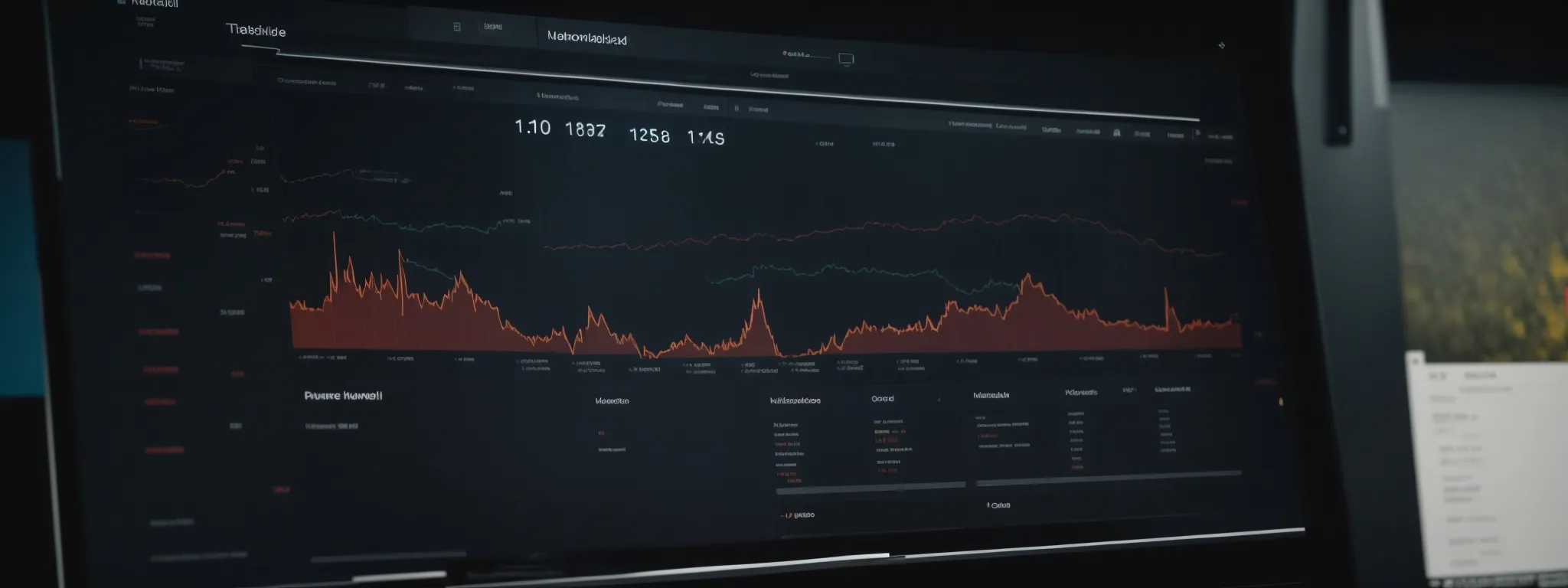Why Keywords Important in SEO
The Crucial Role of Keywords in SEO Strategy In the labyrinthine world of Search Engine Optimization, keywords stand as the bedrock, guiding users to the content that […]
The Crucial Role of Keywords in SEO Strategy
In the labyrinthine world of Search Engine Optimization, keywords stand as the bedrock, guiding users to the content that best satisfies their queries.
Reflecting the needs and language of the target audience, a well-honed keyword strategy propels a website from the abyss of search engine results to the pinnacle of visibility.
Beyond mere placement, strategic keyword optimization ensures that every article, product page, and blog post resonates with both search engines and readers, marrying relevance with discoverability.
As the pulse of digital marketing quickens, staying abreast of keyword trends and behaviors can delineate success from obsolescence.
Keep reading to uncover the profound impact of keywords on SEO and how mastering their potential is essential for any savvy online presence.
Key Takeaways
- Keywords Are Central to Connecting User Queries With Relevant Online Content and Greatly Impact Search Engine Rankings
- The Strategic Use of Long-Tail and Short-Tail Keywords Is Crucial to Target the Right Audience and Achieve Higher Conversion Rates
- SearchAtlas SEO Software Particularly Aids in Comprehensive Keyword Research and Informs Effective Content Strategies
- Continuous Monitoring and Analysis of Keyword Performance Are Essential for Adjusting and Improving SEO Strategies
- Adapting to the Changing Landscape of Semantic Search and Voice Search Is Necessary for Future-Proofing SEO Efforts
Understanding Keyword Fundamentals in SEO

In the realm of search engine optimization, keywords act as the bedrock upon which successful SEO strategies are constructed.
These terms and phrases, carefully selected by content creators and digital marketers, serve as critical signposts that guide search engines and users alike to the most relevant web content.
Fathoming the distinction between short-tail and long-tail keywords is essential, as it reveals much about user intent and the potential reach of content.
Moreover, search engines utilize a sophisticated amalgam of algorithms to parse these keywords and determine the ranking of pages, ensuring that users are met with the most pertinent results.
As one traverses the intricate landscape of SEO, it becomes evident that a profound comprehension of keyword optimization is indispensable for any entity aiming to enhance their digital presence.
What Keywords Are and How They Influence SEO
Keywords are the linchpins that connect user queries to the content on websites, forming the essence of Search Engine Optimization. They are the terms and phrases that audiences enter into search engines and are crucial for boosting a site’s visibility, with a direct impact on Search Engine Rankings and user experience.
The strategic deployment of these keywords across website content, from title tags to meta descriptions, enables search engines to crawl and index the information efficiently. As a result, this makes it more accessible to users, ultimately influencing both the quantity and quality of organic traffic directed towards the website.
The Difference Between Short-Tail and Long-Tail Keywords
In the nuanced world of SEO, short-tail keywords are typically broad, one to two-word phrases with a high search volume. These phrases are highly competitive due to their general nature, making it a challenge for emerging brands to rank highly in search engine results.
Conversely, long-tail keywords consist of longer, more specific phrases that cater to a niche audience. They exhibit lower search competition and often yield a higher conversion rate as they align closely with the user’s search intent:
- Short-tail keywords attract a vast audience but face stiff competition.
- Long-tail keywords target specific queries, resulting in more qualified traffic.
How Search Engines Use Keywords to Rank Pages
Search engines employ complex algorithms that analyze the relevance and authority of web pages based on keyword usage. They scrutinize various on-page factors such as keyword frequency, placement within content, and the correlation between the keywords and the overall topic, which helps to ascertain the relevancy of pages to particular search queries.
To achieve favorable rankings, pages must not only contain relevant keywords but also provide users with substantive value. Search engines like Google go beyond mere keyword matching; they evaluate the context surrounding keywords, the user’s intent, and the content’s quality, employing advanced machine learning to refine search engine results in accordance with these parameters.
How Effective Keyword Research Boosts SEO

Embarking on the journey of elevating a website’s search engine rankings begins with a steadfast commitment to comprehensive keyword research, an endeavor that unveils not only the search terms ripe with potential but also the strategic approaches that ensure visibility and user engagement.
Mastering this phase necessitates an adept use of innovative tools for uncovering keywords, a meticulous analysis of their relative relevance to the content, and a precise assessment of the competitive landscape they inhabit.
Grasping the intricacies involved in these processes empowers businesses to align their SEO efforts with the queries and needs of their target audience, thus paving the way for organic growth and sustained digital success.
Steps for Conducting Keyword Research
Initiating keyword research commences with a thorough analysis of the subject matter, which serves to identify foundational keywords relevant to the business niche. LinkGraph’s SEO Services utilize SearchAtlas SEO software, which equips users with a robust keyword explorer designed to reveal both overarching terms and granular search queries reflective of real user behavior.
LinkGraph harnesses SEO AI Writing Tools and free SEO audit capabilities to meticulously evaluate and refine the applicability of keywords. This strategic approach not only bolsters the visibility of content within search engine results but also enhances the relevance for the intended audience, ensuring that every article resonates with the consumer’s search intent.
Tools You Can Use for Keyword Discovery
The arsenal of SEO professionals is replete with a variety of Keyword Research Tools, each offering unique insights into optimal keyword selection. LinkGraph’s SEO services stand out with their SearchAtlas SEO software, facilitating an all-encompassing keyword discovery process that combines search volume data, keyword difficulty metrics, and actionable SEO reporting insights.
Transitioning from mere data to strategy, LinkGraph employs SEO tools that extend beyond traditional research. The software’s ability to conduct a free backlink analysis empowers businesses to understand the competitive landscape, exploring which terms are propelling competitors forward in search engine rankings and thereby informing a more targeted and effective keyword strategy.
Evaluating Keyword Relevance and Competition
Evaluating keyword relevance and competition is a pivotal step in developing an authoritative SEO strategy. LinkGraph’s SEO services provide an in-depth analysis, aligning clients’ content with the most pertinent keywords that are not just popular but also deeply connected to the brand’s offerings, ensuring a nuanced match with user expectations.
Delineating between viable keyphrase targets involves assessing both search volume and rivalry for ranking predominance. After pinpointing potential keywords with LinkGraph’s SearchAtlas SEO software, the subsequent task is scrutinizing each term’s competitive edge:
- Calculating keyword difficulty to estimate the efforts required for ranking improvements.
- Examining competitor keyword strategies to pinpoint gaps and opportunities.
- Sifting through SERP features to understand the potential for visiblity beyond traditional organic results.
This evaluation is not solely about identifying keywords with the most search queries; it’s about discovering those that will drive the right kind of traffic, thereby maximizing relevance and propelling conversion rates. LinkGraph’s bespoke SEO services ensure that relevance and competition assessments are not only thorough but are turned into actionable insights that reflect in enhanced search engine rankings.
Aligning Keywords With User Intent

At the heart of a tactical SEO strategy lies the meticulous alignment of keywords with the user’s underlying intent, which is vital for attracting and engaging the right audience to a website.
Discerning the diversity of search intents – be it informational, navigational, transactional, or commercial investigation – establishes the blueprint for content optimization that resonates with where a user stands in their buyer’s journey.
By tailoring website content to harmonize with these distinct types of queries, organizations can effectively nurture leads, and enhance the performance of both transactional and informational needs of potential customers, refining their digital strategy to its most potent form.
Identifying Different Types of Search Intent
Identifying the various forms of search intent is imperative in constructing a keyword strategy that serves the precise needs of users. Professionals utilize tools like SearchAtlas SEO software, which lends expertise in deciphering whether users are seeking information, aiming to make a purchase, navigating to a particular site, or comparing services and products before a decision.
LinkGraph’s SEO services excel in mapping keywords to their corresponding user intent. By analyzing behavioral patterns and search query contexts, SEO specialists craft content strategies that not only attract visitors but ensure their interactions align with the business objectives, elevating both user satisfaction and the website’s relevance in search engine results.
Matching Keywords to the Buyer’s Journey
LinkGraph’s SEO services prioritize the buyer’s journey, ensuring that the right keywords are employed at various stages to lead the potential customer from gathering information to making the purchase. This method calibrates content to serve as beacons throughout the path of discovery, consideration, and decision, ultimately guiding the user to take action.
| Buyer’s Journey Stage | Content Focus | Keyword Integration |
|---|---|---|
| Awareness | Educational Content | Information-rich keywords tailored to answer questions and provide solutions. |
| Consideration | Comparative Analysis | Keywords that facilitate product comparisons and highlight differentiating factors. |
| Decision | Strong Call-to-Action | Aggressive keywords that compel the user towards purchase or engagement. |
Through adept application of on-page SEO services, LinkGraph marries keywords with strategic content placement, leading to increased relevancy across the journey’s touchpoints: awareness, consideration, and decision-making. This alignment honours consumer progress through a selection of keywords engineered to echo and meet evolving search intent, marking the transition from passive search to active engagement.
Optimizing Content for Transactional and Informational Queries
Strategic optimization of web content to address transactional and informational queries demands that businesses align their messaging with the user’s intent at each phase of their journey. For transactional queries, LinkGraph’s SEO services fine-tune website content with a strong call to action and persuasive language that fuels the consumer’s decision to purchase or engage with the product or service on offer.
Conversely, content tailored to informational queries is enriched with enlightening and authoritative information designed to sate the users’ thirst for knowledge. By employing a judicious mix of on-page SEO services, LinkGraph ensures that content not only educates but also subtly positions the brand as the optimal solution, driving organic traffic while establishing domain authority.
Strategic Keyword Optimization in Content Creation

Within the intricate tapestry of SEO strategy, the process of infusing keywords into website content represents a critical intersection of art and science.
The creation of compelling web content that resonates with both search engines and users hinges on the adept integration of keywords into titles and headings, the deliberate calibration of keyword density with readability, and the nuanced application of Latent Semantic Indexing (LSI) keywords to enhance content relevancy.
Each of these components requires a sophisticated touch, ensuring that keyword optimization not only meets technical SEO requirements but also delivers a seamless and informative user experience.
Integrating Keywords Into Titles and Headings
The judicious placement of keywords in titles and headings is a foundational practice in on-page SEO, serving as vital signals that enhance the discoverability of web content. Titles, optimized with targeted keywords, elevate a page’s relevancy in search engine result pages, while headings, structured with these key terms, provide a clear and hierarchical presentation of content that benefits both the user and search algorithms.
LinkGraph’s SEO services meticulously orchestrate keywords within these critical on-page elements, ensuring that each title and heading strikes the delicate balance between keyword inclusion and natural, engaging language. This strategic insertion operates as a beacon guiding search engines to the page’s theme and emphasis, effectively optimizing visibility for the intended target audience.
Balancing Keyword Density With Readability
Achieving a harmonious balance between keyword density and readability is an art form that LinkGraph’s on-page SEO services master with precision. They navigate the fine line where keywords enhance a page’s SEO potential without compromising the natural flow of the content, ensuring that website visitors remain engaged and search engines recognize the content’s relevality.
LinkGraph champions the creation of user-centric content, which means that while keywords are necessary for search engine recognition, the ultimate focus remains on providing a clear and enjoyable reading experience. By avoiding the pitfall of keyword stuffing, their approach promotes a reader-friendly atmosphere that can lead to higher dwell times and improved conversion rates.
Using LSI Keywords to Improve Content Relevancy
Incorporating Latent Semantic Indexing (LSI) keywords serves as a tactic to boost content relevancy and assist search engines in understanding context. LinkGraph’s SEO expertise entails the smart application of LSI keywords, thereby expanding the semantic reach of content and enhancing its connection to varied user queries related to the core topic.
LinkGraph utilizes these semantically related phrases to enrich content, fostering a more comprehensive thematic presence that accounts for colloquialisms and synonyms. This practice not only augments the breadth of content visibility but also aligns with evolving algorithms, which favor comprehensive topical depth over mere keyword repetition.
Keywords and SEO Performance Measurement

In the dynamic domain of search engine optimization, the efficacy of a keyword strategy is not solely determined by the integration of search terms into content but by the continuous monitoring and analysis of their performance.
Experts in the field stress the importance of tracking keyword rankings to understand their influence on web traffic, scrutinizing conversion rates to grasp the keywords’ effectiveness, and harnessing these insights to recalibrate strategies.
By delving into this trifecta of evaluative methods, organizations can deftly navigate the digital ecosystem, adjusting their SEO maneuvers to maximize return on investment and achieve their marketing objectives.
Tracking Keyword Rankings and Their Impact on Traffic
Monitoring keyword rankings is paramount for businesses as it offers actionable insights into their SEO Campaign Efficacy. LinkGraph’s SEO services include sophisticated tracking mechanisms that examine how specific keywords impact website traffic, allowing clients to witness how alterations in rankings correlate with shifts in visitor numbers.
This scrutiny plays a pivotal role in discerning the momentum of a site within search engine results, guiding companies to make data-informed decisions. The importance of understanding this dynamic cannot be overstated since keyword performance directly influences organic visibility and, by extension, conversion potential.
Analyzing Keyword Conversion Rates
Delving into the examination of keyword conversion rates uncovers the direct impact of specific terms on a business’s bottom line. LinkGraph’s SEO services place a potent emphasis on this metric, correlating keyword effectiveness with the ability to compel action and complete desired user behaviors.
As businesses seek to optimize their digital presence, analyzing conversion rates becomes an essential exercise in identifying the keywords that not only draw traffic but also drive meaningful engagements, ultimately defining the ROI of the SEO campaign.
| Keyword | Traffic Drawn | Conversion Rate | Resulting ROI |
|---|---|---|---|
| Keyword A | High volume | Low percentage | Negative impact |
| Keyword B | Moderate volume | High percentage | Positive impact |
| Keyword C | Low volume | Very high percentage | Significant positive impact |
Adjusting Your Strategy Based on Keyword Insights
Gleaning insights from keyword performance data is vital for iterative refinement of SEO strategies. Armed with this knowledge, marketing teams led by LinkGraph’s experts recalibrate their content and keyword deployment techniques in real-time, targeting improved engagement and higher rankings on search engine result pages.
This process demands a proactive and agile approach to SEO, where ongoing evaluation informs tactical adjustments. LinkGraph’s analytical prowess ensures that clients’ SEO strategies evolve with changing search patterns and competitive dynamics, securing continued digital growth and market relevance.
The Evolution of Keywords in Future SEO Trends

As the digital landscape progresses, the function and optimization of keywords in search engine optimization (SEO) persist in their evolution.
This forward momentum signals the significance of adapting to semantic search complexities where Keyword Context becomes pivotal, ensuring that SEO strategies align with natural language processing advancements.
Simultaneously, the surging prevalence of Voice Search demands acclimatization to conversational keywords, thus reshaping traditional SEO paradigms.
Foresight into these transformations necessitates robust, long-term keyword strategy planning, enabling businesses to stay competitive in an increasingly dynamic search environment.
The Rise of Semantic Search and Keyword Context
The introduction of semantic search marks a transformative epoch in SEO as search engines advance in discerning the intent and contextual meaning behind queries. This sophisticated method of interpretation requires SEO campaigns to finely tune content, ensuring relevance extends beyond mere keywords to the rich tapestry of related concepts and nuances within a subject area.
As this paradigm shift ensues, the focus on keyword context has never been more essential, encouraging content creators to infuse their work with semantically linked terms that enrich a website’s thematic depth. LinkGraph’s SEO services adeptly navigate this complexity, applying nuanced keyword strategies that accommodate the intricacies of semantic search.
| Trend | SEO Implication | LinkGraph’s Strategy |
|---|---|---|
| Semantic Search | Enhanced focus on intent and context | Content infused with relevant, semantically linked terms |
| Keyword Context | Requirement for thematic depth and variations | Strategic keyword optimization that resonates with semantic algorithms |
Adapting to Voice Search and Conversational Keywords
The ascendance of voice search ushers in an era where conversational keywords become paramount, steering SEO experts towards a vernacular that mimics the cadence of spoken language. LinkGraph’s SEO services are at the vanguard, optimizing content with natural language patterns to ensure compatibility with voice-activated queries and devices.
Addressing the linguistic nuances of voice search, LinkGraph tailors SEO strategies that resonate with the ease and specificity of verbal requests. Their approach allows businesses to tap into the increasing swath of users who rely on voice commands to navigate the internet, effectively expanding their Digital Footprint into this burgeoning domain.
Staying Ahead With Long-Term Keyword Strategy Planning
Ensuring longevity in the digital marketplace necessitates a strategic foresight in keyword planning, where LinkGraph’s SEO services carve a pathway for enduring success. Embracing a long-term vision, their experts craft keyword strategies that anticipate market changes, user behavior evolutions, and algorithmic updates, securing a Sustainable Competitive Edge for clients.
With a gaze fixed on the horizon, LinkGraph predicates its approach on adaptability and progressive refinement, positioning businesses to swiftly capitalize on emerging search trends. Their meticulous planning entails a continuous re-assessment of keyword efficacy, ensuring organizations remain at the forefront of SEO innovation.
Conclusion
Keywords serve as the vital connectors between user searches and relevant web content, forming the foundation of any successful SEO strategy.
Understanding the distinction between short-tail and long-tail keywords, and aligning them with user search intent, is crucial for driving qualified traffic and achieving high conversions.
Search engines use sophisticated algorithms that go beyond simple keyword matching, evaluating relevance and context to provide users with the best results.
Effective keyword research, using tools like LinkGraph’s SearchAtlas SEO software, is essential for uncovering valuable search terms and understanding the competitive landscape.
This enables businesses to align their content with the needs and intent of their target audience, thereby improving visibility and user engagement.
The integration of keywords into website content must be skillful, balancing on-page SEO demands with a natural and informative user experience.
By tracking keyword performance and adjusting strategies accordingly, businesses can effectively measure the impact of their SEO efforts and refine their tactics for better ROI.
Finally, as the digital landscape evolves with advances in semantic search and voice search, ongoing keyword strategy planning is imperative for maintaining competitiveness.
Embracing such forward-thinking approaches ensures that SEO strategies evolve alongside technology and user behaviors, guaranteeing sustained digital success.














































































